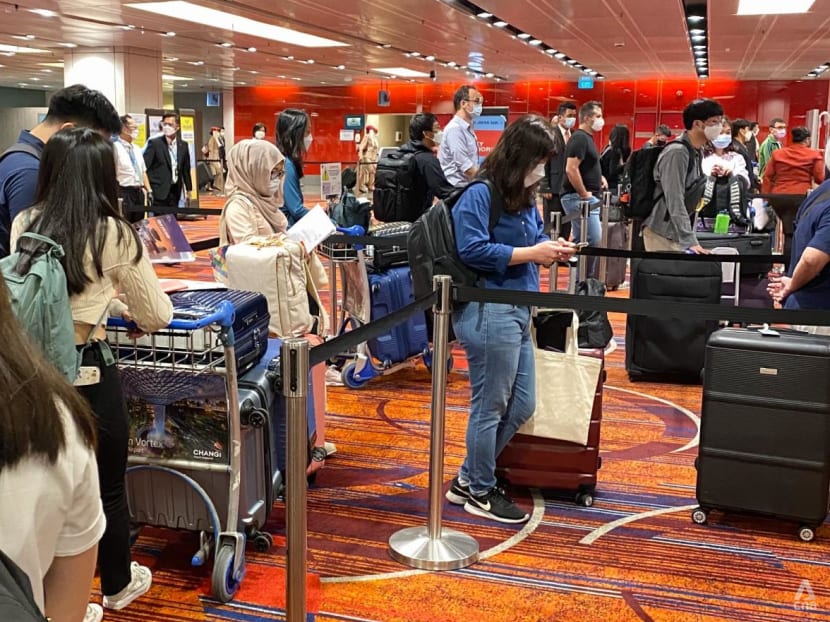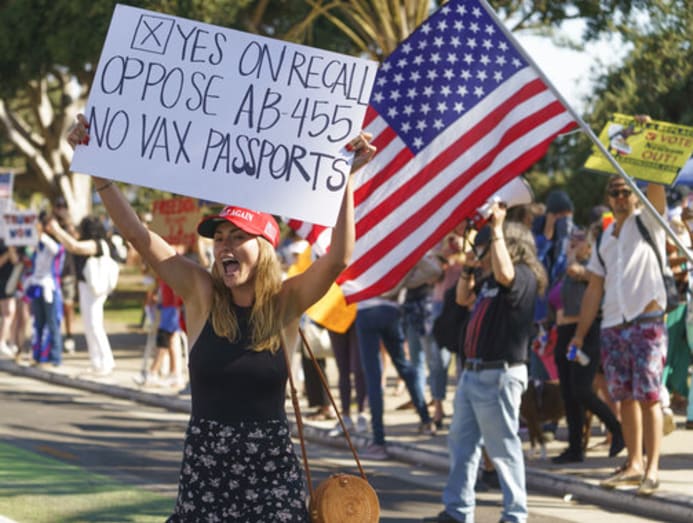Commentary: Why is a global vaccination certificate for travel taking so long to work out?
Establishing a global vaccine passport is looking like a long shot when many parts must come together, says INSEAD’s Wesley W Koo.

Passengers queue at Changi Airport for a VTL flight from Singapore to South Korea on Nov 14, 2021. (Photo: Gaya Chandramohan)
SINGAPORE: Most countries have a way to digitally verify if their residents are vaccinated.
In Singapore, there’s TraceTogether. Germany was the first country to issue a European Union Digital COVID Certificate recognised across EU countries.
But because an internationally recognised COVID-19 vaccination certification is lacking, people crossing borders, like travellers using the vaccinated travel lanes from the United States to Singapore, might encounter frictions.
After some overseas Singaporeans faced challenges with obtaining the needed vaccination proof to return home, the Civil Aviation Authority of Singapore eased rules and broadened the type of records that can be presented.
This issue is coming into sharper focus as more countries open up quarantine-free travel for the vaccinated and people want to travel again.
While authorities around the world can exercise flexibility, recognising that this may be a teething issue to some extent as travellers from more jurisdictions visit their country, it raises the question of why a universally accepted standard for a travel vaccine passport is taking so long.
MANY PARTS MUST COME TOGETHER SO A VACCINE PASSPORT WORKS SEAMLESSLY
The big issue is that it is difficult to find a stakeholder who has the capability to create, promote and defend a set of common standards across national borders.
To understand why a vaccine passport is so difficult to implement at the global level, we need to think about a couple of concepts: Modularity and offline frictions.
The concept of modularity relates to how units which are developed independently can function together as a whole.
Think of Lego pieces and smartphone apps: Manufacturers around the world produce pieces that fit together to make Lego castles, and different iOS (iPhone Operating System) developers create apps that can be accessed seamlessly and work together on users’ iPhones.
Indeed, a modular ecosystem is an effective solution to technological complexity. It allows companies and organisations to break down complex tasks into individual modules, and lets third-party developers innovate in one’s ecosystem.
However, despite the effectiveness of a modular ecosystem, a prerequisite for modularity is that a set of standards usually must be championed by at least one influential stakeholder. In the case of smartphone apps, it is Apple and Android’s operating systems that have the buy-in of millions of developers around the world.
GETTING BUY-IN FOR A STANDARD IS HARD
Creating a vaccine passport is easy. People with required technical skills can quickly generate a set of QR codes that uniquely identify a person’s vaccine records.
China has a QR code system categorising people with different-coloured virus statuses that can be scanned for entry into public spaces.
But the trouble is promoting a standard that is easily accepted by the governments of major countries.
Companies like Apple, Intel and Tencent have generated widely adopted standards through a combination of monetary subsidies and negotiations, with key stakeholders such as hardware manufacturers and software developers.
These tech companies already occupy very influential positions in their ecosystems in the first place. Their influence enables them to align incentives and get the buy-in of various stakeholders.
In the case of the vaccine passport, governments face disincentives in the promotion of a global vaccine standard.
The need to ensure quality immunisation registries, as well as to provide technological support such that records are easily accessible and verifiable while upholding privacy requires money, manpower and political resources.
Promoting a digital standard is an intricate, expensive process with uncertain outcomes and the possibility of backlash.
Apart from tourism-reliant economies like Thailand and Greece hoping to revive travel, political leaders embattled by COVID-19 have other priorities that take precedence and may deign to promoting a global standard that might agitate the vast majority of their citizens who do not travel abroad.
Political division between Indian states created hurdles for the implementation of India’s digital national ID, especially during the pandemic lockdowns when migrants needed to use the ID to access food rations.
The process of digitalising and sharing data was also hampered by political borders within India.
A WORLD OF OFFLINE FRICTIONS
A second reason why standard-setting and utilising a standard is so difficult relates to the offline interface of digitisation – the political, social, and cultural factors that affect how individuals and organisations adopt and utilise a digital tool.
Leaving aside the generally positive atmospherics of the Joe Biden-Xi Jinping summit, geopolitical tensions between countries make it exceedingly difficult to establish a standard.
It’s hard to see how the “green code” in China’s WeChat will be accepted in the US without major political backlash, after WeChat was banned briefly under the Trump administration, or how a digital standard created in the US will be accepted in China.
Even within a country like the US, state officials disagree on whether entry to indoor activities – malls, restaurants, gyms – should require proof of vaccination.
Have we reached a turning point for travel with more vaccinated travel lanes opening up? Listen to CNA's Heart of the Matter:
Globally, this profound inability to reach a common global standard remains despite passes like the International Air Transport Association (IATA) Travel Pass app, the AOKpass from International SOS and the CommonPass by the World Economic Forum, which have proliferated at limited scales.
DIGITAL DIVIDES WITH A VACCINE PASSPORT
Even after a digital standard is established, certain segments of the population may not be able to use it.
The less educated, the poor, and those located in remote or underdeveloped regions are especially vulnerable to missing out when most are less familiar with technologies, like the QR code, which many of us take for granted, despite it being adopted widely in many countries and by certain population segments.
The ability to effectively use a digital tool often comes from interactions with others who have mastered the tool, instead of self-learning.
Research by INSEAD found e-commerce entrepreneurs in rural China are less capable of understanding online algorithms compared to their urban counterparts because they do not have many offline, real-world contacts who can teach them about the algorithms.
Similarly, marginalised individuals, including migrant workers who cross borders for work, may be more likely to not adopt a digital vaccine passport if they cannot learn to effectively use it.

Cultural traditions and belief systems may impede the uptake of a digital vaccine passport even if one is established.
If one has concerns over the implications for privacy of personal information or strongly detests government involvement in personal affairs, they may hesitate to apply for the vaccine passport.
MOVING TOWARDS A GLOBAL STANDARD
Moving toward a standardised digital vaccine passport at the global level is an urgent task, especially for countries like Singapore that depend so heavily on international trade.
While the world has seen an increasing amount of remote communication through platforms such as Zoom, face-to-face communication is still key for facilitating knowledge exchange and in-depth learning, which are key to innovation and important deal- and decision-making.
A smooth travelling experience enabled by a vaccine passport standard will encourage more travel and more productive communication.
Several measures can increase the effective adoption of one. First, simplicity is key.
The passport standard needs to be easy to implement in regions with few resources and little technical talent. A standard that requires multiple layers of interaction, for example, requiring a separate institute to verify records, is likely to be unfeasible.
Second, while the standard must remain simple, the system needs to have a fair amount of modularity.
Each country should have space to ensure record-keeping and reporting, and present other countries’ governments with a highly convenient interface to convert their country's vaccine record to the common standard.
It should allow WeChat to develop a tool to let Chinese citizens convert their green codes to the global standard with one click for example.
Third, the promoter of the passport standard likely needs to be an international organisation or a private entity, like the World Health Organization, rather than a particular government, to overcome the geopolitical tensions among countries posing barriers toward standard-setting.
Fourth, the standard promoter should start small with a few countries, demonstrate success, and quantify the impact in terms that make sense to governments around the world.
Advertising success of the standard will put pressure on other countries to adopt it. As more countries adopt the standard, positive network effects will occur.
The EU Digital COVID Certificate is a good start. For the 27 EU countries that have long shared the same currency, import tariff code and a variety of other economic standards, embracing a common vaccination certification is less controversial.
The trouble is extending this to countries outside of the bloc like Russia that not only have their own digital vaccine standards but also the Sputnik COVID-19 vaccine not recognised by the EU.
This is not an impossible task when acceptance of the EU Digital COVID Certificate has broadened to a total of 43 countries, though it remains challenging.
Wesley W Koo is an Assistant Professor of Strategy at INSEAD based in Singapore.









